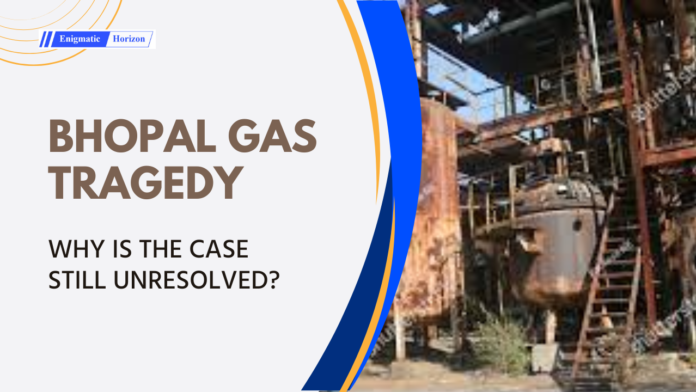The Bhopal Disaster, or Bhopal Gas Tragedy was a chemical accident that occurred on the nights of December 2 and 3, 1984, at the Union Carbide India Limited (UCIL) pesticide plant in Bhopal, Madhya Pradesh, India. It is considered the world’s worst industrial disaster, as over 5,00,000 people living in the small towns around the plant were exposed to the highly toxic gas methyl isocyanate (MIC). The initial effects of exposure were coughing, severe eye irritation and, a feeling of suffocation, burning in the respiratory tract, blepharospasm, breathlessness, stomach pains and vomiting by the next morning. The official number of immediate deaths was reported to be 2,259. In 2008, the government of Madhya Pradesh claimed that it had paid compensation to the family members of 3,787 victims killed in the gas release and also to the family members of 5,74,366 injured victims. This statement is doubtful, as there are reports that the case is still not settled.
The primary causes of death were reflexogenic circulatory collapse, choking, and pulmonary edema. People who made it through were at risk of getting cancer, going blind, losing their jobs, and having trouble paying their bills.
The accident happened due to the installation of inadequate and improper safety systems. By early December 1984, most of the plant’s MIC-related safety systems were malfunctioning, and many valves and lines were in poor condition. The undesirable impact of the disaster on nature was also equally severe.
After the disaster, the Uniform Civil Code, the governments of the United States and India, the local government of Bhopal, and the people who were affected by the disaster all got involved in legal proceedings. The Indian Government passed the Bhopal Gas Leak Act in March 1985, which led to the beginning of legal proceedings. However, it clearly seems that the case has not been settled, although 39 years have passed.
The prime accused – the Chairman of Union Carbide Corporation at the time of the disaster, Warren Anderson – and two of the three companies accused in the case — Union Carbide Corporation (UCC) and Union Carbide (Eastern) – never showed up in court for trial. UCIL and its eight Indian officials faced trial and were sentenced to two years’ imprisonment. Anderson passed away in the USA in September 2014. Following public outrage over the light punishment meted out to the accused, the CBI filed a curative petition in the Supreme Court seeking a tougher jail term, which was dismissed. A six-member justice bench is now in charge of the case.
Thirty-nine years later, the case drags on, and survivors of the world’s worst industrial disaster are still in pursuit of justice.
Industrial safety is one of the most crucial issues to be concentrated upon by any business or enterprise. To keep the employees, society, and environment completely safe and secure is the prime duty of the management. Failure in this aspect brings threat to the lives of not just the employees and the management themselves, but to the entire society and the entire environment as well. The Bhopal disaster is one of the biggest examples of this. The air, water, and soil there are still toxic, and people there are still suffering, along with the newborns and the un-borns. The Bhopal Disaster is a harsh lesson that the government and big corporations still need to learn from.
